Berta Cáceres was assassinated by Honduran government-backed death squads on March 3. She fought for indigenous peoples’ power and for control over their own territories. She was not destined to die of old age. She spoke too much truth to power. Beverly Bell writes a moving tribute: ¡Berta Cáceres, presente!
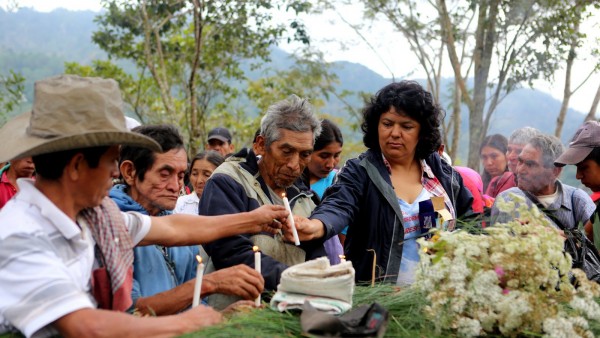

¡Berta Lives! The Life and Legacy of Berta Cáceres
By Beverly Bell, Published in UpsideDownWorld
I began writing a eulogy for Berta Isabel Cáceres Flores years ago, though she died only last week. Berta was assassinated by Honduran government-backed death squads on March 3, 2016. Like many who knew and worked with her, I was aware that this fighter for Indigenous peoples’ power; for control over their own territories; for women’s and LGBTQ rights; for authentic democracy; for the well-being of Pachamama; for an end to tyranny by transnational capital; and for an end to US empire was not destined to die of old age. She spoke too much truth to too much power.
Honduran authorities said they have arrested on March 3, 2018 an energy company executive, electrical engineer Roberto David Castillo Mejia, allegedly “as the intellectual perpetrator” behind Cáceres’s murder. Officials said Castillo had served as CEO of the company Desarrollos Energeticos (DESA) — which Cáceres actively campaigned against over plans to build a hydroelectric dam — at the time of the activist’s slaying. He was “responsible for providing logistics and other resources to the perpetrators,” the statement said. It was at least the ninth arrest in the killing, but advocates insist this is only one in a string of long overdue arrests still outstanding.
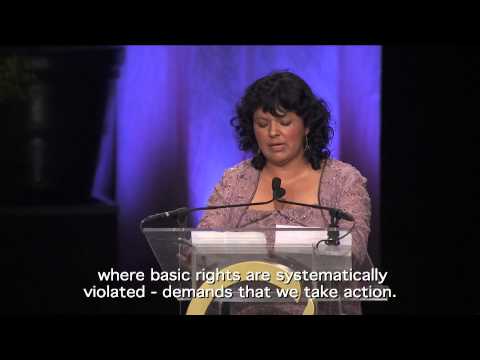
Watch this video on YouTube
Berta Caceres acceptance speech, 2015 Goldman Prize ceremony
Berta cut her teeth on revolution. She was strongly marked by the broadcasts from Cuba and Sandinista-led Nicaragua that her family listened to clandestinely, gathered around a radio with the volume turned very low; those stations were outlawed in Honduras. Always a committed Leftist, Berta’s mother raised her many children to believe in justice. Doña Bertha – the mother made her youngest child her namesake – was mayor and governor of her town and state back when women were neither, in addition to being a midwife. She was Berta’s life-long inspiration. As a young adult, like so many others from the region who shared her convictions, Berta went on to support the Salvadoran revolution.
In 1993, Berta – a Lenca Native – co-founded the Civic Council of Popular and Indigenous Organizations of Honduras (COPINH). At that time in the country, there was little pride and even less power in being indigenous. Berta created COPINH to build the political strength of Lencas, campesinos, and other grassroots sectors to transform one of the most corrupt, anti-democratic, and unequal societies in the hemisphere.
“In our world views, we are beings who come from the Earth, from the water, and from the corn. The Lenca People are ancestral guardians of the river, in turn protected by the spirits of young girls, who teach us that giving our lives in various ways for the protection of the rivers is giving our lives for the well being of humanity and this planet.” — Berta Cáceres
STORY: Drilling in the Caribbean: Honduran Indigenous Communities Speak Out
A Political Force: COPINH under Berta’s leadership
Berta loved to say, “They fear us because we’re fearless.” The fearlessness paid off over the years. COPINH has successfully reclaimed ancestral lands, winning unheard-of communal land titles. They have stalled or stopped dams, logging operations, and mining exploration – not to mention free-trade agreements. They have prevented many precious and sacred places from being plundered and destroyed.
In addition to Berta’s remarkable leadership, COPINH’s victories have come through their size, strength, unity, and fierce commitment. Communities have participated in hundreds of protests, from their local mayors’ office to the steps of the national congress. They have occupied public spaces, including several of the six US military bases in their country, and refused to leave. They have shut down the road to Tegucigalpa, strategically blocking goods from moving to the city. They have declared a boycott of all international financial institutions on their lands. They have helped coordinate 150 local referendums to raise the stakes on democracy.
Another Member of Berta Cáceres’ Group Assassinated in Honduras – TELESUR TV
Why Assassinate Honduran indigenous leader Berta Cáceres? More than 300 hydroelectric dams now planned for Honduras (49 on COPINH lands). Eight hundred seventy-two contracts have been handed out to corporations for mining alone, with many others created for mega-tourism, wind energy, and logging projects. The majority of these are planned for indigenous lands. — Beverly Bell
Here is one of many tales that Berta told of strategies and actions. The backstory is that Honduran farmers – which most COPINH members are – wear thick work boots made of unventilated rubber. Over their course of containing sweaty feet, they come to smell horrendously, so bad that campesinos/as refer to them as bombas, bombs. Early in COPINH’s history, a team went from La Esperanza to Tegucigalpa to negotiate with the government on a land titling law. The discussions went on for days. Berta told that, during lunchtime, the government received lavish, catered meals; the COPINH members had no money, and so their side of the table stayed empty. Far less connected in those days, the group had nowhere to sleep or shower, and spent the nights in the streets. At one point, the negotiations were tense and the members of COPINH’s team were shaky on their strategy. They asked for a recess, but the government refused. So someone on the COPINH side gave a discrete signal, and altogether the farmer-activists pulled off their bombas. The smell was so toxic that the government officials fled the room. COPINH was able to regroup and develop a stunning strategy. The Indigenous radicals won the law.
“Let’s build societies that are able to coexist in a dignified way, in a way that protects life. Let us come together and remain hopeful as we defend and care for the blood of this Earth and its spirits. I dedicate this award to all the rebels out there, to my mother, to the Lenca people, to Rio Blanco, to COPINH, and to the martyrs who gave their lives in the struggle to defend our bounty of nature.” — Berta Cáceres
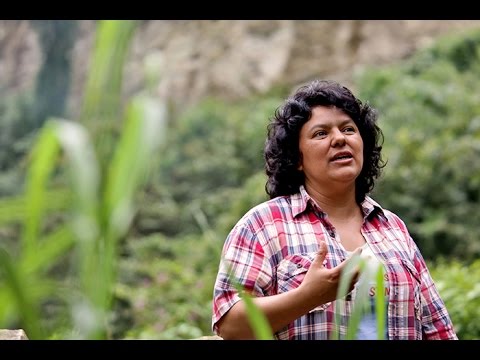
Watch this video on YouTube
Mother of All Rivers, Berta Cáceres, 2015 Goldman Environmental Prize, Honduras, Produced/Directed by Will Parrinello
The most recent campaign and partial victory are also the proximate causes of Berta’s death: stopping the Agua Zarca dam project on a sacred Lenca river. The COPINH community of Rio Blanco – everyone: elders, toddlers, nursing mothers – formed a human barricade and blocked construction of the dam. Meanwhile, Berta, other members of COPINH, and national and international friends pressured the World Bank and the largest dam company in the world, Chinese state-owned Sinohydro, to pull out. Rio Blanco did not blockade the construction for an hour or for a day, or for a week. They did it for more than a year. They did it until they won. They got the most powerful financial interests in the world to abandon the project. Tragically, because other financial interests are always waiting in the wings to plunder for profit, the dam is still under construction. Forty-eight more are either planned or underway on their lands.
Since [former deposed President Mel] Zelaya’s ouster, there’s been an all-out assault on [peasant and indigenous movements]—torture, murder, militarization of the countryside, repressive laws, such as the absolute ban on the morning-after pill, the rise of paramilitary security forces, and the wholesale deliverance of the country’s land and resources to transnational pillagers. That’s not to mention libertarian fantasies, promoted by billionaires such as PayPal’s Peter Thiel and Milton Friedman’s grandson (can’t make this shit up), of turning the country into some kind of Year-Zero stateless utopia. — Greg Grandin in The Nation
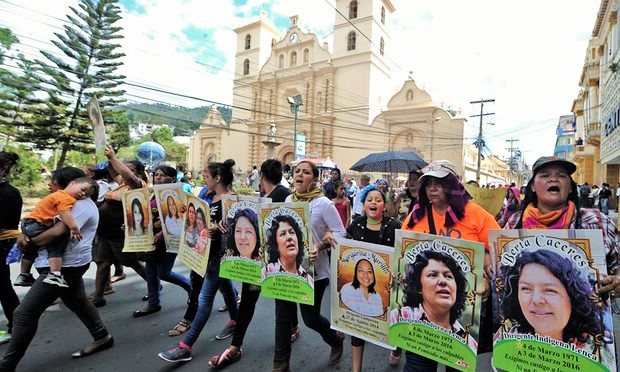

Berta’s belief in participatory democracy extended profoundly to her everyday practice. As the unparalleled leader of COPINH, and with a large gap between her level of education and political experience and that of all but a few in the group, it would be have been easy for her to act on her own. Yet she always made herself accountable to the communities she worked for.
I saw the degree of this commitment in action one night when Berta called in to Utopia, COPINH’s rural community meeting center, and asked to speak to everyone. Fifteen or so people quickly gathered around the cell phone on the shaky wooden table next to the only light, that of a candle. Berta explained a fairly pro forma request that had come to her from a government office, and proposed a response. When she was finished, she asked the almost exclusively illiterate, campesino/na group, “¿Cheque sí, o cheque no?” All raised their thumbs toward the little cell phone and called out, “Sí!” No joint decision had been required, and yet she had sought consensus.
That’s accountability.
The Woman Behind the Myth
Berta was unflappable. She was calm in the face of chaos and strategic in the face of disaster. She got right in the face of soldiers and goons when they aggressed her or others, and told them what was what.
Berta was indefatigable, working around the clock with no complaint. When not traveling around Honduras or the world to raise support for the struggle, she would wake early and go straight to her desk to receive updates, often on the most recent attacks on COPINH members, and in those cases to write condemnations – all even before a cup of coffee. She would then jump into her yellow beater truck to pick up other members of COPINH and head off to wherever action or investigation was needed.
I was amazed that Berta drove that noteworthy truck everywhere without protection, and that she lived in a house secured by only a small bolt and a couple of friendly dogs. Then I realized that it made no difference how much security she had. The government and the companies she opposed almost always knew where she was (Berta also spent periods in deep hiding), and how to get her when they were ready to kill her.
Berta took two small breaks in her life. The first was a two-week vacation with a friend in a neighboring country, the second a three-month semi-repose at my house in Albuquerque – though even then she spent most of her days building a continent-wide boycott of the World Bank and Inter-American Development Bank.
Even as she served her community, Berta rose in the past decade to become an international people’s diplomat. She was a heroine to many global movements, a critical player in many struggles, a keynote speaker at many venues. She was someone consulted by government officials, by international networks, and even, a few months ago, by Pope Francis.
Berta Cáceres: “We’re coming out of a coup that we can’t put behind us. We can’t reverse it. It just kept going. And after, there was the issue of the elections. The same Hillary Clinton, in her book, “Hard Choices,” practically said what was going to happen in Honduras. This demonstrates the meddling of North Americans in our country. The return of the president, Mel Zelaya, became a secondary issue. There were going to be elections in Honduras. And here, she, Clinton, recognized that they didn’t permit Mel Zelaya’s return to the presidency. There were going to be elections. And the international community—officials, the government, the grand majority—accepted this, even though we warned this was going to be very dangerous and that it would permit a barbarity, not only in Honduras but in the rest of the continent. And we’ve been witnesses to this.”
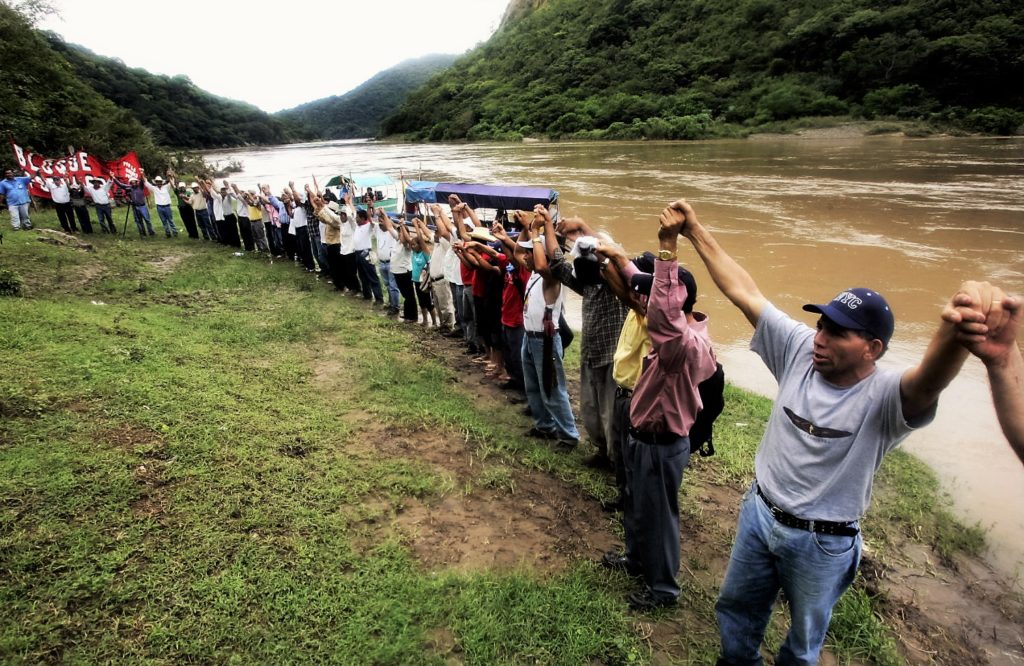

As we watched Berta’s rise as a global leader, our close friend and colleague Gustavo Castro commented to me, “I hope she never loses her humility.” She never did.
I once asked Berta how to say “integrity” in Spanish. She translated it “coherencia,” coherence between one’s stated principles and actions, coherence amongst all parts of one’s life. Berta had coherence.
She was highly critical of US Americans for our lack of that coherence. She once led an anti-oppression training for an organization I was running, in which she asked us to examine whether we were Caesars or artisans. She meant whether our practice – not just our statements – aligned us with the oppressors or with the oppressed, and whether we were promoting the grassroots or ourselves as leaders. For a long time after, the refrigerator that Berta and I shared held her line drawing of a thonged Roman sandal. She also commented to me once that the problem with US Americans is our attachment to comfort.
Berta herself eschewed comfort. She lived in the modest house in which she was raised, where she cared for her elderly mother. She slept in a bare cement room, more than half of which had been converted to her office, housing her desk with its mountain range of documents and small computer table. Her trademark style – regardless of with whom she was meeting – was jeans, sneakers, and a cotton shirt. She did not shop, go to fancy restaurants, take a plane when a bus was available.
Besides COPINH and the struggle for justice, Berta had another profound commitment: to her mother and her four children. I recall watching the deep pride on Berta’s face when one of her daughters, then only 7 or so, recited a poem “Las Margaritas” (The Daisies) for a group of foreign visitors; it was a very different expression than I had ever seen. She grew prouder as her three daughters and son grew older, all of them holding the flame for justice.
Berta was killed …
by corporations and investors who conceive of the world – its forests and earth, its natural resources, its rivers, waters and air, its people and all life forms – as exploitable and discardable objects, and then steal, kill and destroy mightily to make their millions and billions, — Grahame Russell, Rights Action
Following Berta’s murder, her children and mother issued a statement in which they said, “We know with complete certainty that the motivation for her vile assassination was her struggle against the exploitation of nature’s common wealth and the defense of the Lenca people. Her murder is an attempt to put an end to the struggle of the Lenca people against all forms of exploitation and expulsion. It is an attempt to halt the construction of a new world.
“Berta’s struggle was not only for the environment, it was for system change, in opposition to capitalism, racism and patriarchy.”
After the Honduran government dropped sedition charges against Berta – one of its countless attempts to silence her — in 2013, someone asked her mother if she were scared for her daughter. Laughing, Berta quoted her mother’s response: “Absolutely not. She’s doing exactly what she should be doing.”
Berta’s humor was legend. A joke from her, and her soft up-and-down-the-scales laugh, punctuated the most tense of moments and kept many of us going, even as she never strayed from the gravity of the situation. One of her jokes was recirculated this week by radical Honduran Jesuit priest Ismael “Melo” Moreno. He once accompanied her to Rio Blanco, where someone snapped a photo of them together. As she peered at the picture, Berta laughed and said to Melo, “Let’s see which of the two of us goes first.”
When Berta saw a performance of the Raging Grannies, a group of elder women who dress up in outrageous skirts and joyously sing protest songs at rallies and events in Albuquerque, she told me, “I never wanted to live to be an old woman. Now I do.” That chance was just taken from her.
Among the suspects that Movimiento Amplio por la Dignidad y Justicia (MADJ) says the police should be investigating are the local management of Desarrollos Energéticos, and particularly its managing engineer for the project Sergio Rodríguez who has threatened the COPINH protest marchers, including Cáceres, with death. MADJ also identifies the mayor of San Francisco de Ojuera, the town whose extent includes the region disputed. Mayor Raúl Pineda ignored the rights of the Lenca people to their land. And finally, a US-Canadian partnership called Blue Energy, with plans for two dams in Lenca territory, have been responsible for death threats. — Honduras Culture and Politics
STORY: Model Cities: Neo-Colonialists Seek Submissive Wild For Capitalist Utopia
Repression in the Wake of Berta’s Death
One person witnessed the assassination: Gustavo Castro Soto, coordinator of Otros Mundos Chiapas/Friends of the Earth Mexico, coordinator of the Mesoamerican Movement against the Extractive Mining Model (M4), and co-founder and board member of Other Worlds. A close friend and ally of Berta, Gustavo slept in her house on the last night of her life to provide accompaniment in the hope of deterring violence, something dozens of us have had to do for her over the years. Gustavo was shot twice and feigned death. Berta died in his arms.
Gustavo was immediately detained in physically and psychologically inhumane conditions by the Honduran government, and held for several days for “questioning.” The subsequent days have resembled a bad spy movie, with Gustavo finally given permission to leave the country, only to be seized at the migration checkpoint at the airport by Honduran authorities, then placed into protective custody in the Mexican Embassy, only to be handed back to Hondurans, who took him back to the town of La Esperanza again for “questioning.” The Honduran government has just said that Gustavo must stay in Honduras for 30 days. He is being “protected” by the Tigers, vicious US-funded and -trained “special forces.”
Chillingly, according to the State Department, the US is cooperating with the Honduran investigators. A note from a close colleague, from outside Gustavo’s place of detention yesterday, said that a team of US “FBI types” are actually in the interrogation room. The role of the US government in the attempted destruction of social movements in Honduras is vast. One can draw also draw a straight line from Washington to Berta’s death. But that is the topic of another article.
Gustavo continues to be in terrible danger in Honduran custody, as what he witnessed is an impediment to the government’s attempts to pin Berta’s murder on COPINH itself. In a note to some friends on March 6, Gustavo wrote, “The death squads know that they did not kill me, and I am certain that they want to accomplish their task.”
The Honduran government also imprisoned COPINH leader Aureliano “Lito” Molina Villanueva for two days just after Berta’s murder, on “suspicion in a crime of passion.” It is interrogating COPINH leaders Tomas Gomez and Sotero Chaverria, while denying them lawyers. This is part of an effort to criminalize COPINH members. Now, COPINH needs more than ever to be protected, to be supported, and to carry on the legacy that Berta helped to build.
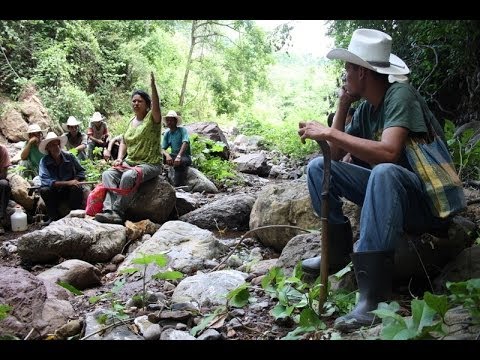
Watch this video on YouTube
Austrian “documentary” on Berta and COPINH and the struggle for land rights and protection of the forests and rivers. In Spanish with German subtitles.
¡Berta Lives!
Berta touched everyone she met, and even countless ones she didn’t. My young daughter is one of those. The morning of Berta’s death, she wrote this: “Bev tells me that her close friend Berta died last night. I was shocked, because how can somebody kill someone who was only trying to do what’s right? Then I remembered they killed Martin Luther King and Malcolm X. If I die for doing the right thing, that would let me know that I did my part in this world. Just like Berta.”
When Berta received the 2015 Goldman Prize, the most prestigious environmental award in the world, she dedicated the prize to rebellion, to her mother, to the Lenca people, to Rio Blanco, to COPINH – and “to the martyrs who gave their lives in defense of the riches of nature.”
Now Berta is one of these martyrs.
Berta, Gustavo, and I were co-founders in 1999, and have remained active members of, the grassroots network Convergence of Movements of the Peoples of the Americas (COMPA). Early on the horrific morning of March 3, a COMPA listserv note blasted the news of Berta’s assassination. Reading that message, I spotted the posting just prior, dated February 24. It was from Berta. It read simply, “Aqui!” I am here!
She is here. Long may Berta live, in the hearts, minds, passions, and actions of all of us. May all women and men commit themselves to realizing the vision of transformation, dignity, and justice for which Berta lived, and for which she died.
¡Berta Cáceres, presente!
Many thanks to Jeff Conant and Simone Adler for help writing and posting this article. Thanks, also, to Kate Brown, Lucinda Ellison, Lyle Aufdermeyer, Jeff Conant, Neil Tangri, and Moira Birss for help.
Post Updated 29 September 2024

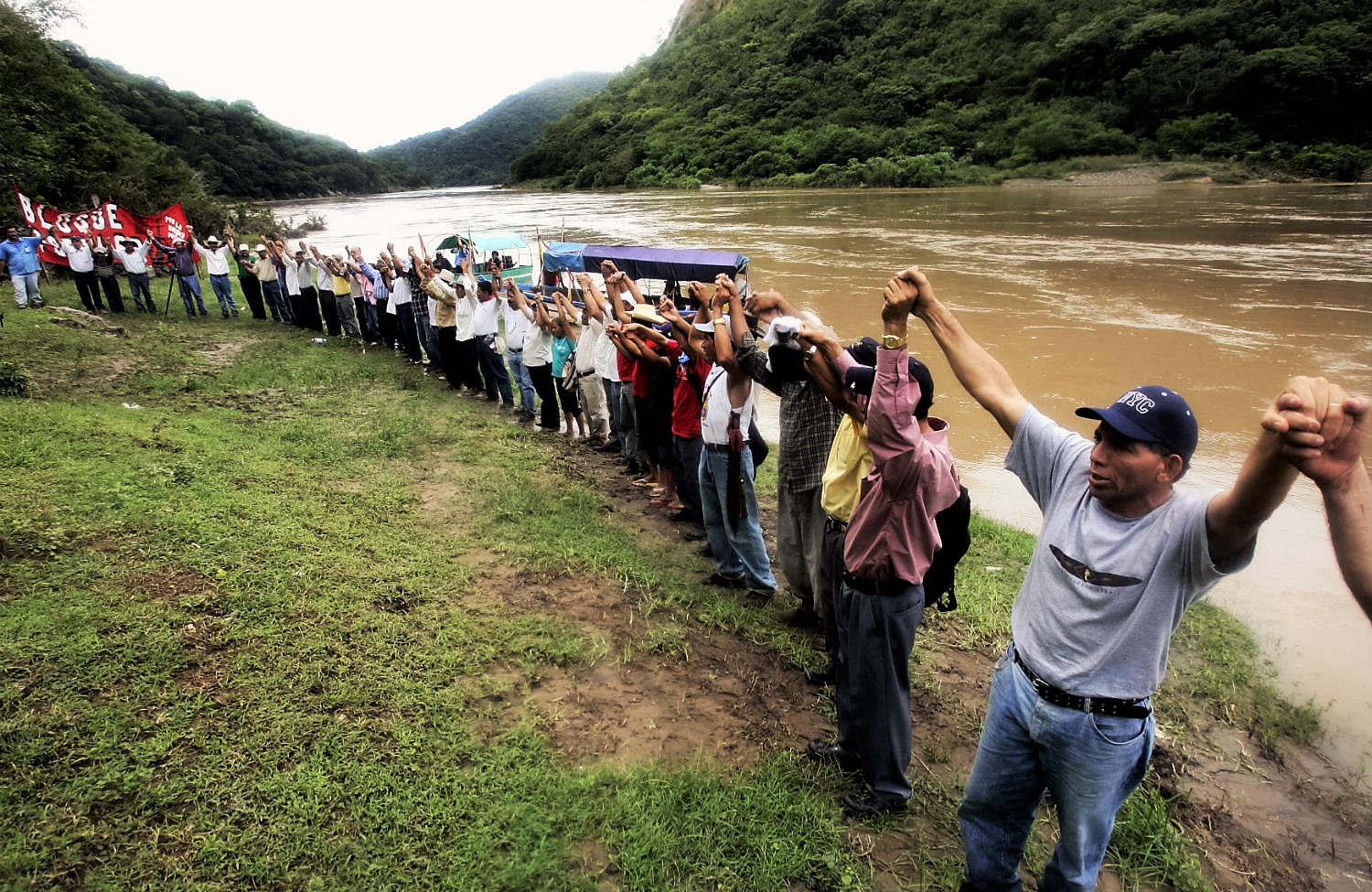


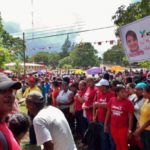
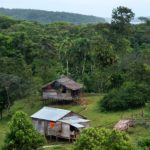
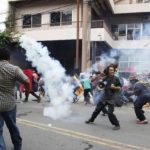



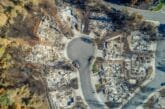



Pingback: US Financing Dictatorship in Honduras | WilderUtopia.com